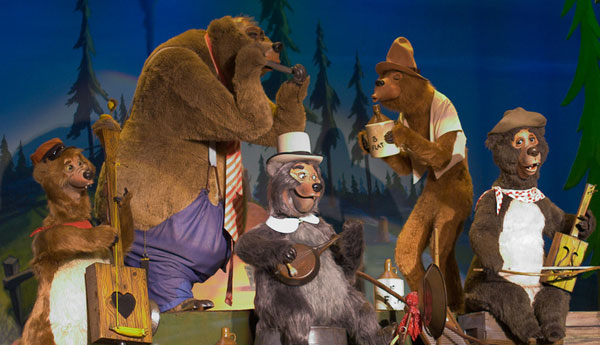Study: 96 Percent Of Humans Would Rather Be Animatronic Bear
 Print This Print This
By Staff
The Onion
Tuesday, Aug 23, 2011
 |
CHARLOTTESVILLE, VA—The University of Virginia published the results of an extensive 18-month study Wednesday revealing that 96 percent of human beings across the planet would strongly prefer to be a singing, dancing animatronic bear.
The UVA researchers, who conducted thousands of surveys with residents of 196 different countries, discovered that despite belonging to diverse socioeconomic, racial, ethnic, and age groups, nearly all respondents said their ideal existence would involve being an animatronic bear wearing comfy overalls and a big floppy hat.
"While analyzing the collected data, we found that an overwhelming number of participants claimed the carefree, down-home life of a robotic bear was far more appealing than their own lives," said Professor Daniel Vaughn, who led the study. "Most expressed a conviction that nothing would be more enjoyable than sitting on a plastic log, strumming a banjo, and singing songs on stage with their goofy animatronic bear friends."
Vaughn also noted that many people were attracted to the prospect of an animatronic bear's brief workday, insisting that performing songs for several minutes and then being allowed to power down and sleep for long stretches of time would be superior to a regular job.
In addition, study participants said receiving the adoration of young children, attending birthday parties every day, and working in a place that always smelled like fresh-baked pizza had greatly influenced their preference to be an electromechanical bear.
"Imagine a life in which there's always a jamboree, it's always a sunny day, and no one ever troubles you for anything," said 46-year-old Cleveland native Charley Hale. "You never have to pay taxes, and all you really have to do is blow in a jug a few times, sing some dumb words, and happily smile away with your pretty animatronic girl bear at your side."
"God, why can't that be my life?" Hale added.
According to the 320-page study, 96 percent of respondents believe that performing a maximum of six programmed body movements and speaking in a limited number of prerecorded sounds must provide a comforting routine for robot bears, who can relax instead of worrying about what do with their arms and legs, or what to say and think.
"You wouldn't even have to open the door to your little bear house, because it's fully automated and pops open by itself," said Mishkat Zia, 34, a resident of Rangpur, Bangladesh. "You just slide out on a rail and don't have to stress out about which way you're going. Plus, you don't need to learn any of the songs, because they put all of that on a computer chip. And they have the air- conditioning blasting all the time."
After interviewing thousands of participants, researchers learned that many people envied animatronic bears because they lack brains and are able to lead tranquil lives without ever experiencing doubt, sadness, or pain. The study also found that most people would rather have an animatronic bear's single, smiling facial expression, which seems to indicate constant happiness.
Sociologist Diana Norris, who examined and analyzed the data from the survey, found that every person in the study expressed concerns about the frailty of the human body, which they felt was inferior to the animatronic bear's mechanical anatomy.
"Participants were very worried about larger human issues like injuries, illnesses, and aging, but also things like sweating too much, getting fat, smelling bad, and feeling sore," said Norris, adding that survey respondents liked the idea of being very soft like a bear. "In addition, most noted that if an animatronic bear did have a problem, a technician would repair it right away. A small percentage said even if they stopped working entirely, they would still rather be a nonfunctioning animatronic bear than a human."
Despite such widespread consensus on robotic bears, 4 percent of participants disagreed, saying they would prefer to be a life-sized wax replica of actor Harrison Ford.
Source URL
 Print This Print This

|

